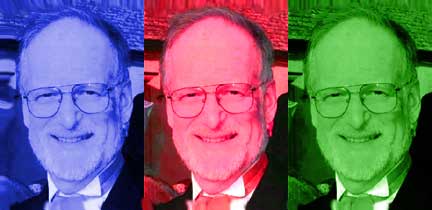TWO NEW PHRASES came into common usage in the last couple of weeks of Dr Kelly's life. Every news bulletin seemed to lead with the latest on the row between the BBC and the government, and these two key phrases:
1. "The 45-minute claim:" The claim that Saddam Hussein had weapons of mass destruction which could be launched at 45 minutes' notice.
2. To "sex up:" To exaggerate the case for war. BBC journalist Andrew Gilligan alleged that the "September Dossier," published by the government to demonstrate the case for war with Iraq, had been "sexed up." Specifically, Gilligan stated that "a senior intelligence source" told him that Alastair Campbell (Tony Blair's Director of Communications / spin doctor) insisted on adding the 45-minute claim to the dossier, knowing it to be inaccurate. The 45-minute claim was then repeated in the House of Commons by Tony Blair.
Not to be confused with:
3. To "plagiarise:" That was the other dossier.
I first caught a glimpse of Dr Kelly on the evening news, which I wasn't really watching, I just saw it in the corner of my eye while trying (and failing) to persuade my daughter to go to bed. I only saw his back, as he was (presumably) walking into the inquiry. He was an old-ish guy in a beige jacket, looked like a teacher. I heard them say something about him maybe being a scapegoat, wheeled out to take the blame for this mess. The government reckoned he was Andrew Gilligan's source, and as a government employee he was clearly in a difficult position.
The next day I saw some of the hearing on TV in the afternoon, again I wasn't really watching, but it was on. The thing that got my attention was the look on a member of the select committee's face as he put a question. I can't even remember the question, just that he was leaning forward, his top lip was curled up at one side, and he reminded me of a dog with a bone.
So I stared intently for a minute or two trying to figure it out, it seemed so incongruous. Dr Kelly was calmly, quietly, reasonably stating that he couldn't recall, but that it didn't sound like the kind of thing he would say. For some reason this answer seemed to irritate the questioner, who pointed out with a cold hard stare that he was required to answer their questions. I didn't get it. After watching Dr Kelly for all of two minutes I would've thought it would be obvious to anyone that "sexed up" was not the kind of phrase that would readily roll off his tongue. His answer seemed perfectly reasonable. He spoke in a quiet, polite, measured way; not a quietness that indicated he was flustered (though that came later), more like a quiet, understated confidence. At this point he looked to me like the most (or the only) reasonable and sensible person in the room. I was starting to like him, and to feel incensed on his behalf at the way he was being spoken to.
The questioner was a Labour MP, and I assumed that he had his own reasons for his attitude. Maybe he was hoping for brownie points with Tony Blair, or maybe he was genuinely annoyed with this man he believed had accused the Labour government of exaggerating intelligence (i.e., misleading the House of Commons, a serious allegation).
The news bulletins continued to bang on about it. The BBC refused to divulge whether Dr Kelly was the source of their story. The select committee concluded that he was not, but the government still insisted that he was. Dr Kelly himself didn't know. So the impression I was left with was that no-one was exactly telling the truth, with the possible exception of Dr Kelly, but I wasn't sure about that either: as an ex-civil servant I knew how much trouble he was in for giving unauthorised press briefings in the first place. The Guardian and others pointed out that this whole thing was a convenient (or rather deliberate) distraction from the actual point of the inquiry, which was to determine whether the government had lied to us about the case for war with Iraq.
On the Friday morning I logged in to AOL to check my email, and the headline was "Missing Weapons Inspector: Body Found." I didn't even know anyone had gone missing. There was no photo. I clicked on the headline to see the story, and there was Dr Kelly's picture. I was stunned. He'd been all over the TV for days, everybody knew who he was, everybody had an opinion, and you kind of felt as if you knew him. He seemed like such a sweet man. I felt very sad that what turned out to be the last few days of his life had been so unpleasant for him. I emailed some friends with the subject line "chilling news," and turned on the TV again to see what would unfold.++

